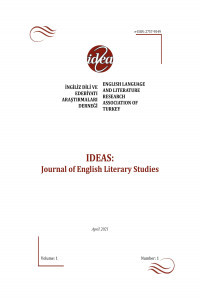“Dünya çok fazla bizle”: Günümüz Edebî Çalışmalarının Karakteri
Yeni milenyumda edebi çalışmalar, kilit öğesi yapısökümcülük olan ve büyük K ile yazılan Kuram’dan bir paradigma kaymasıyla ayrılarak merkezine toplumu, çevreyi ve siyaseti alan, yüzünü iyileştirici/onarıcı bir itki ile geleceğe çeviren “kuram-sonrası” döneme girdi. Günümüz edebi çalışmalarında, özellikle posthümanizm ve yeni materyalizm gibi öne çıkan akımlar, postyapısalcılığın göreceliğe dayalı epistemolojisinden daha gerçekçi bir ontolojiye yönelmekte. “Kuram-sonrası” veya “Post-teori” denilen bu dönem, ‘Kuram’a aynı anda iki farklı tavırla yaklaşıyor: minnet ve eleştiri. Bir yandan kuramdan kalan entelektüel mirasa ve pratiklere çok şey borçlu olduğunu kabullenirken, diğer yandan Kuram’ın özcülük karşıtlığını veya ethos eksikliğini eleştirerek temel aksiyomlarını çağdaş ontolojik kaygılar ve motiflerle yeniden değerlendiriyor. Çağımız, terörizm, savaş, ekonomik kriz, göç, Covid 19 pandemisi, iklim değişikliği, petrol ve su krizleri, Antroposen, tüketimcilik, dijitalleşme ve demokrasi sorunu gibi birçok sorunla boğuşmakta olan kaotik bir çağ. Çağın sorunlarının getirdiği aciliyet duygusu ve bu duygunun edebiyattaki temsilleri, nihayetinde, beşeri bilimlerdeki akademisyenlerden “karakter” (temel, zihinsel ve ahlaki vizyon, ethos) ve gerçek eleştiri (değerlendirme) gibi beklentileri öne çıkarıyor. Bu makale “karakter” talebini odağına alarak günümüz edebi çalışmalarının ve bu çalışmalarda öne çıkan etik, estetik yönelimlerin ana hatlarını ortaya koymayı amaçlamaktadır.
Anahtar Kelimeler:
Kuram-sonrası, Etik, Estetik, Karakter, Post-postmodernizm, Edebi çalışmalar
"The World is too much with us:" The Character of Literary Studies Today
Literary studies in the new millennium are described as “post-theoretical,” which implies a paradigm shift from the deconstructive linchpin of capital-t Theory, to a more socially, politically and environmentally engaged, future-oriented, and reparative drive in our discipline. There is a change of attention from the relativist epistemology of poststructuralism to realist ontology in the new fields of study such as posthumanism and new materialism. Post-theory holds two concurrent attitudes toward Theory: acknowledgement and critique. On the one hand, it is indebted to the legacy of Theory and forms discursive practices in relation to it; on the other hand, it is critical of Theory’s anti-essentialism or lack of ethos, and reassesses its foundational axioms with contemporary ontological anxieties and motives. Ours is a chaotic century with manifold problems such as terrorism, war, economic crisis, COVID-19 pandemic, climate changes, oil and water crises, Anthropocene, consumerism, migration, digitalisation, and the question of democracy, etc. This sense of emergency, and its representations in literature, eventually, calls for “character” (essential, mental and moral vision, ethos) and genuine critique (evaluation) from the academics in humanities. This paper aims to offer an outline of the network of practices in literary studies as well as their ethical and aesthetic allegiances with this demand for “character” in mind.
Keywords:
post-theory, aesthetics, ethics, post-postmodernism, ethical turn,
___
- Agamben, Giorgio. What is an Apparatus? And Other Essays. Translated by David Kishik and Stefan Pedatella. Stanford University Press, 2009.
- Anker, Elizabeth, and Rita Felski. Critique and Postcritique. Duke University Press, 2017.
- Antakyalıoğlu, Zekiye. “Table of Differences: Theory/Post-Theory.” Post-Theories in Literary and Cultural Studies. Lexington Books, 2022, p. 262.
- Best, Stephen, and Sharon Marcus. “Surface Reading: An Introduction.” Representations, vol. 108, no. 1, 2009, pp. 1–21. doi:10.1525/rep.2009.108.1.1.
- Boxall, Peter. The Value of the Novel. Cambridge University Press, 2015.
- ---. The Prosthetic Imagination: A History of the Novel as Artificial Life. Cambridge University Press, 2020.
- Braidotti, Rosi. The Posthuman. Polity, 2013.
- Braidotti, Rosi, and Maria Hlavajova. Introduction. Posthuman Glossary, edited by Braidotti and Hlavajova, Bloomsbury, 2018, pp. 1–14.
- Callus, Ivan, and Stefan Herbrechter. Post-Theory, Culture and Criticism. Rodopi, 2004.
- Colebrook, Claire. “Extinct Theory.” Theory After ‘Theory’, edited by Jane Elliott and Derek Attridge, Routledge, 2011, pp. 62–73.
- Deleuze, Gilles, and Félix Guattari. A Thousand Plateaus: Capitalism and Schizophrenia, Volume 2. Translated by Brian Massumi. University of Minnesota Press, 1987.
- Eliot, T. S. “Tradition and the Individual Talent.” Selected Prose of T. S. Eliot, edited by Frank Kermode. Harcourt, 1975, pp. 37–45.
- ---. “The Metaphysical Poets.” Selected Prose of T. S. Eliot, edited by Frank Kermode. Harcourt, 1975, pp. 59–68.
- Elliott, Jane, and Derek Attridge. “Introduction: Theory’s Nine Lives.” Theory After ‘Theory’, edited by Elliot and Attridge, Routledge, 2011, pp. 1–17.
- Hardt, Michael, and Antonio Negri. Empire. Harvard University Press, 2000.
- Hartman, Geoffrey. Criticism in the Wilderness: The Study of Literature Today. 2nd ed., Yale University Press, 2007.
- Jameson, Fredric. Postmodernism or the Cultural Logic of Late Capitalism. Duke University Press, 1997.
- Laclau, Ernesto. Preface. Post-Theory: New Directions in Criticism, edited by Martin McQuillan et al., Edinburgh University Press, 1999, pp. vii–viii.
- Leitch, Vincent B. Literary Criticism in the 21st Century: Theory Renaissance. Bloomsbury, 2014.
- McQuillan, Martin, et al., editors. Post-Theory: New Directions in Criticism. Edinburgh University Press, 1999.
- Nealon, Jeffrey T. Post-Postmodernism or the Cultural Logic of Just-in-Time Capitalism. Stanford University Press, 2012.
- ---. Fates of the Performative: From the Linguistic Turn to the New Materialism. University of Minnesota Press, 2021.
- North, Joseph. Literary Criticism: A Concise Political History. Harvard University Press, 2017.
- Osborne, Peter. “Philosophy After Theory: Transdisciplinarity and the New.” Theory After ‘Theory’, edited by Jane Elliott and Derek Attridge. Routledge, 2011, pp. 19–34.
- Rabaté, Jean-Michel. The Future of Theory. Blackwell, 2002.
- Sedgwick, Eve Kosofsky. Touching Feeling: Affect, Pedagogy, Performativity. Duke University Press, 2003.
- Woolf, Virginia. Mr. Bennet and Mrs. Brown. Hogarth Press, 1924.
- Wordsworth, William. “The World is too much with us.” William Wordsworth, edited by Stephen Gill. Oxford University Press, 2010, p. 237.
- Başlangıç: 2021
- Yayıncı: İngiliz Dili ve Edebiyatı Araştırmaları Derneği / English Language and Literature Research Association of Turkey
Sayıdaki Diğer Makaleler
Moll Flanders Romanında Anaerkil Alanlar ve Moll'un Kimlik Kazanımında Etkileri
Review of Posthümanizm: Kavram, Kuram, Bilim-Kurgu
Atkinson’ın Suç Romanlarında Jane Eyre’in Feminen Özne Arayışının Tekkerürü
Review of Global Milton and Visual Art
“Dünya çok fazla bizle”: Günümüz Edebî Çalışmalarının Karakteri
Dalkey Arşivi’nde Arşive Dair Şüphe ve Yazarlık Arzusu
